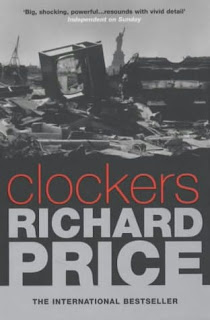
The following comment on Richard Price’s 1992 NBCC finalist, Clockers, comes from Rafiyq Abdellah, a model for the character Strike in the book. He first met Richard Price in the late ‘80s at Daytop Village, a Bronx center that “provides services for those who seek help with life’s problems compounded by substance abuse.” A longtime friend of Price’s, he’s currently a clothing designer living in Brooklyn. He plans to launch his own line, Black Cotton Premium Threads, in fall of 2008.
I’m from Jamaica, Queens. I grew up in an era where it was crime-infested, and little children at that time who were my age, we found our fun doing things that might be considered dangerous—hanging out at night, selling drugs, trying to make money, stuff like that. So when I met Richard, I was into that type of lifestyle—running in the streets, hanging out, trying to make a name for myself. Hanging around the wrong people. He taught me how to take that same type of energy and hone in on my craft, my natural skill. So he was a mentor to me.
Growing up in Queens, I would always be in the projects—that’s where my friends were at. My father was a drug dealer, so growing up I was watching those types of things, that influenced by creativity, my imagination. I would be very restricted in imagining anything else. To have a hint of something better, you have to be shown better. That’s where the disparity was coming from—I wasn’t really seeing better. Seeing better only came through the means of doing what my peers or my elders were doing. When somebody tries to show you something different, you might visually register it—“Oh, that’s better.” But the process that you have to take to get there is…it’s a road that’s seldom traveled.
I’m not anti-authority. I just don’t like those individuals who are in authority who abuse their authority and just run amok. And for the most part, that’s how I viewed the system. It does not help. It does not rehabilitate anybody. I don’t look at it like the authorities are there to protect and serve—they’re there to protect and serve their interests, which is their policy. If you go into Chinatown, you see the indigenous people being policed by the people who look like them. Go anywhere else in the urban ghettos, you see it’s speckled, and there’s little tolerance for the inhabitants and the police. It’s the ingredients for a Molotov cocktail—it’s going to explode. Time and time again, history reflects that. But no one really cares, because there’s no organization in the ghetto. What role did the police play? They played very strong one. I never wanted to go back.
Within the cracks and crevices of the boulevards, a lot of things go on there. There’d be dangerous shootouts, stuff over turf, the influx of crack cocaine made it that way, where it became very volatile. Youth couldn’t come out and play anymore. Residential life as we knew it was threatened, because of this epidemic. Growing up, I have vague memories, but it was very different [before crack]. There was heroin and liquor. But it wasn’t as degrading. There are levels of degradation. When the crack epidemic came, it just tore everybody apart. It tore families apart. The high would only last for two or three minutes, you were out there fiending, doing things you knew you had no business doing. I’ve had family members whose lives have been riddled, time and time again because of a relapse. I watched it.
We show love in the best way that we understand it. And for individuals growing up in that environment—let’s say you come home from prison and your friends, the only way that they know how to show love to you is to give you drugs. “Here, get on your feet, make some money.” But it’s a sick, twisted kind of love. That was the cash crop that you were selling to make money, to live whatever little lifestyle you thought you was living. Everything that goes on on the corner on an illegal level is just a microcosm of the macro—it’s the same thing, it’s just illegal. It’s the same principles: You’re buying guns, you’re buying arms for your security, you’re doing the same things that foreign policy does, you have to secure this turf. It’s the same thing. Put it under the microscope and you’ll find similarities.

